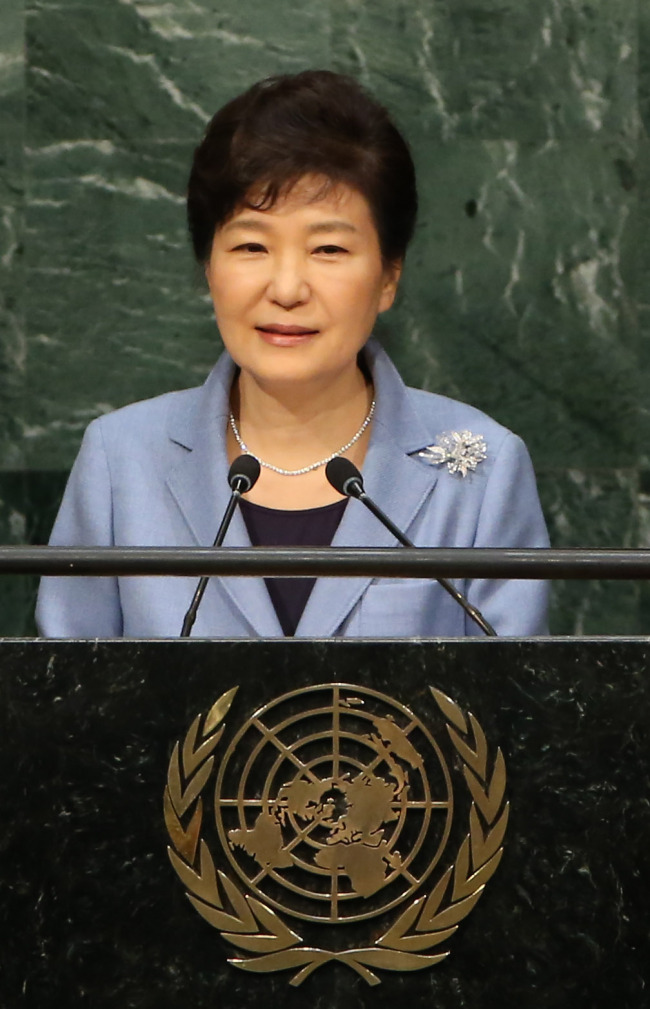President Park Geun-hye wound up a trip to New York after a whirlwind of diplomacy at the U.N.
General Assembly focused on preventing North Korea from provocations, drumming up support for unification and promoting the “Saemaeul” rural development program.
Park’s four-day trip followed tensions on the Korean Peninsula flaring anew after North Korea hinted it could conduct a long-range rocket launch or a fourth nuclear test, possibly around the Oct. 10 anniversary of the North’s ruling Workers Party.
The No. 1 focus of her U.N. diplomacy was to prevent the North from committing such provocations.
“North Korea should make efforts to ensure that its people can get out of difficulties through reform and openness rather than” carrying out an additional provocation, Park said in an address to the U.N. General Assembly on Monday.
A new rocket launch, if carried out, could prompt the U.N. Security Council to further tighten sanctions on North Korea, which has long been under an array of U.S. and international sanctions for its missile and nuclear tests.
Park said that a rocket launch could harm the hard-won atmosphere of dialogue between South and North Korea and undermine efforts to resume the long-stalled negotiations aimed at ending North Korea’s nuclear weapons program.
During a meeting Saturday with heads of leading U.S. think tanks focused on Korean Peninsula issues, Park also increased pressure on Pyongyang by renewing her resolve to deal thoroughly and sternly with North Korean provocations.
But she also said the South will keep its door open for dialogue with the North.
Another focus of her U.N. diplomacy was to promote her vision for unification.
 |
| President Park Geun-hye delivered a speech at the 70th Session of the General Assembly of the United Nations on Monday. (Yonhap) |
In meetings with U.N. Secretary-General Ban Ki-moon, heads of think tanks and an address to the U.N. General Assembly, Park emphatically stressed that unification would be a “fundamental solution” to such issues as North Korea’s nuclear weapons program, its dismal human rights record and provocations.
She also said that inter-Korean unification would eliminate the last-remaining legacy of the Cold War.
For years, Park has been known for her pitches for unification that she said would be an economic “bonanza” for the two Koreas as well as a blessing for neighboring countries because it will touch off massive investments in North Korea, mainly in infrastructure projects.
Her calls for inter-Korean unification at the U.N. were meaningful in that efforts to win support for the cause have expanded to countries around the world after South Korea and China agreed during her visit to Beijing early this month to expand discussions on the issue.
Park’s visit to the U.N. also served as a chance to confirm South Korea’s increased international profile.
She was invited to the U.N. Sustainable Development Summit, the U.N. Global Education First Initiative and a meeting on climate change, as well as the leader’s summit on peacekeeping and made pledges of contributions to the causes.
During the meetings, Park pledged to donate $200 million in aid to 15 poor countries under the “Better Life for Girls” initiative over the next five years and to dispatch additional military engineers to conflict zones as it steps up efforts to boost U.N. peacekeeping operations.
The pledges were meaningful in that they symbolized the transformation of South Korea from a key recipient of U.N. aid after the 1950-53 Korean War to a donor making active contributions to international prosperity and peace.
On the sidelines of the sustainable development summit, an event focused on South Korea’s “Saemaeul Movement” was also held.
The rural development program, initiated by Park’s father former President Park Chung-hee, was credited with helping modernize the then-rural South Korean economy.
South Korea has been sharing its “Saemaeul Movement” experience with developing nations.
Despite such a hectic schedule, Park also made time for one-on-one summits with the leaders of Pakistan, Denmark and Nigeria to advance South Korea’s economic interests in the countries. Cheong Wa Dae officials said that the summits with Pakistan and Nigeria paved the way for South Korean firms to expand to billions of dollars of infrastructure projects in the countries. (Yonhap)

